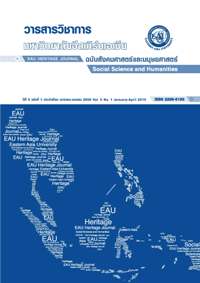การพัฒนารูปแบบการบริหารแบบมีส่วนร่วม ของสำนักงานเขตพื้นที่การศึกษาประถมศึกษา
Keywords:
รูปแบบ, การบริหาร, การมีส่วนร่วม, model, development, participationAbstract
การวิจัยนี้มีวัตถุประสงค์ เพื่อพัฒนารูปแบบการบริหารแบบมีส่วนร่วมของสำนักงานเขตพื้นที่การศึกษา ประถมศึกษา เป็นการวิจัยและพัฒนา โดยใช้วิธีการศึกษาเอกสาร การวิเคราะห์ข้อมูลใช้วิธีการวิเคราะห์เนื้อหา นำผลที่ได้ไปร่างรูปแบบสัมภาษณ์ผู้ทรงคุณวุฒิเกี่ยวกับความคิดเห็น ที่มีต่อร่างรูปแบบ ปรับรูปแบบ ตรวจสอบ ความเหมาะสมและความเป็นไปได้ของรูปแบบครั้งสุดท้ายโดยผู้อำนวยการหรือรองผู้อำนวยการสำนักงานเขต พื้นที่การศึกษาประถมศึกษา ผลการวิจัยพบว่า รูปแบบการบริหารแบบมีส่วนร่วมของสำนักงานเขตพื้นที่การศึกษา ประถมศึกษา ประกอบด้วย 4 ส่วนคือ ส่วนที่ 1 ส่วนนำ หลักการ วัตถุประสงค์และบริบท ส่วนที่ 2 ระบบการ บริหารแบบมีส่วนร่วมและวิธีการบริหาร วิธีการบริหารแบบมีส่วนร่วม (1) การกำหนดนโยบายและการวางแผน (2) การตัดสินใจ (3) การดำเนินการ (4) การติดตามและประเมินผล (5) ร่วมรับผิดชอบและรับประโยชน์ ส่วนที่ 3 การนำรูปแบบไปใช้ ส่วนที่ 4 ข้อจำกัดในการนำรูปแบบไปใช้
Development of Participation Administration Model of Primary Educational Service Area
The main purpose of this research was to propose a development of Participation Administration Model of Primary Educational Service Area . The research and development is based on documentary analyses. An analysis of the content yields relevant data based on which the draft model is constructed. Through interviews, the views of experts on the draft model was obtained. Their pertinent comments were then availed of for adjustment of the model, which was scrutinized for verification of suitability and feasibility at a final collective consultation of Director of education service area office. The results of this research were as follows; Part 1: Introduction with emphases on the context and development of the concept Part 2: The development of participatory model comprising of (1) planning (2) decision-making (3) implementing(4) monitoring and evaluation (5) benefiting Part 3: Direction for application of model with emphases on legislation. Part 4: Condition or limitations of the model.





